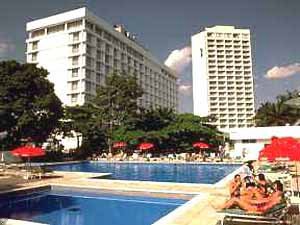 Our friend Cedric Kalonji, has undertaken a marvelous task: to be a Congolese man, in the Democrat Republic of the Congo, living what passes there as a normal life, blogging - and photoblogging - about his outlook on realities in the Congo, for the DRC leaders and the world to see, and hopefully react. It is a daunting task, as many Congolese people, especially those that are abroad, resent their country being portrayed as a poor, wartorn, devastated and plundered country, with a looming feeling of helplessness, and resignation. These people even send letters of recrimination to Cedric, because he is "contributing to
Our friend Cedric Kalonji, has undertaken a marvelous task: to be a Congolese man, in the Democrat Republic of the Congo, living what passes there as a normal life, blogging - and photoblogging - about his outlook on realities in the Congo, for the DRC leaders and the world to see, and hopefully react. It is a daunting task, as many Congolese people, especially those that are abroad, resent their country being portrayed as a poor, wartorn, devastated and plundered country, with a looming feeling of helplessness, and resignation. These people even send letters of recrimination to Cedric, because he is "contributing tothe misrepresentation of what Congo really is, and perpetuating that negative image of the Congo in the media, thus doing a big disservice to the country". Really? I mean what would be a proper representation of the Congo as it "really" is? I wonder.
See, Congolese people are very proud of their people, which is more than commendable. Like in many other countries this pride often translates to a great deal of latent patriotism, even in the face of the country's present state. This is even stronger in those that live outside the country. Although much of it has to do with a very strongly community-based value system, I would venture that much of it has to do with the 32 years of Mobutu's regime, and its constant calls for patriotism and authenticity. Much of the 20-40 years old people grew up most their life under Mobutu, and constantly hammered rhetoric, as to how the country is so rich, and so powerful, and such an engine for the entire continent of Africa... that has got to leave a mark.
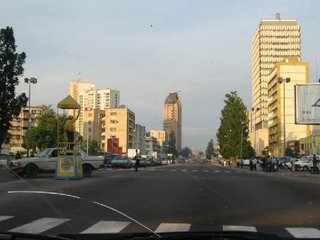
(Image of downtown Kinshasa, DRC)
So what image do many of these Congolese wish to portray of their country? This one (left). The bustling center of the 8 million people strong metropolis of Kinshasa, the capital city. This is a city with high-rises, and supermarkets, and broadband internet (at 500$ a month). This a city with Indian, Chinese, French, Italian, Greek and Middle Eastern restaurants. This is a city where you can buy an HD tv set, while there are no HD tv channels. This is a city with cellphones, plush nightclubs, plush villas and palaces - as in "Mont-Fleuri", Kinshasa's gated "Beverly Hills". You will find a marina, two 4 star hotels, a state of the art golf course, and access (with a GREAT deal of money) to all the basic common facilities, accomodations and comforts that one can find in the West. This is somewhat true for the city of Lubumbashi. Those may indeed be things to be somewhat proud of, and to promote and encourage.
The problem, however, is that most (I would say 80%) of the people living in Kinshasa do not have the opportunity to actually make use of all those nice facilities; they simply cannot afford them (with the notable exception of cellphones), even the simplest ones like swimming pools. And so Kinshasa - a mirror of the whole country - has become a community of a very few haves, and a LOT of have-nots. As the UN mission cars and people, along with the country's corrupt leading class, enjoy the best the country has to offer, the rest suffer, and grovel, in the other reality of the Congo.
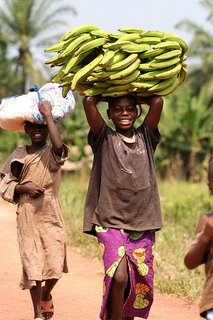 Two parallel worlds, two faces of the same people, in the same country, live along each other… they yet have to crash, but it may not be far ahead. The reality the majority of Congolese people live is this: A territory with a much praised economic potential, that they have never, ever seen even remotely realized. See, the Congo is mostly a very rural country, with very rudimentary living conditions, even in the urban areas. Services, one of the primary duties of the government have become close to non-existent, in those areas where they ever did exist. The level of denigration that the population has endured from colonial times on, with one of its peaks during the 2 Congo wars, has left scars that will take at least a generation to heal. Despite the numerous great minds that the Congo has produced – and I honor them, the enormous intellectual potential that seemed to peak at independence, has largely also not been realized. Literacy levels have dropped, and informal (some will say illegal) hustling has trumped honest work, as the most reliable source of income, generating an inversion of values in the minds of much of the youth growing up in these troubled times – the adults are affected just as much.
Two parallel worlds, two faces of the same people, in the same country, live along each other… they yet have to crash, but it may not be far ahead. The reality the majority of Congolese people live is this: A territory with a much praised economic potential, that they have never, ever seen even remotely realized. See, the Congo is mostly a very rural country, with very rudimentary living conditions, even in the urban areas. Services, one of the primary duties of the government have become close to non-existent, in those areas where they ever did exist. The level of denigration that the population has endured from colonial times on, with one of its peaks during the 2 Congo wars, has left scars that will take at least a generation to heal. Despite the numerous great minds that the Congo has produced – and I honor them, the enormous intellectual potential that seemed to peak at independence, has largely also not been realized. Literacy levels have dropped, and informal (some will say illegal) hustling has trumped honest work, as the most reliable source of income, generating an inversion of values in the minds of much of the youth growing up in these troubled times – the adults are affected just as much.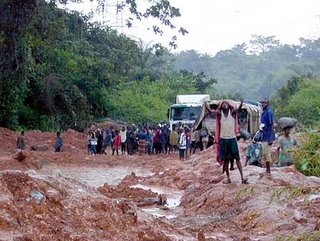 There is also a turn towards all the negative traditions, due to desperation, with the rise of witch-hunts, and the resurgence of tribalism. After having heard 40 years on that they were living in a rich and prosperous country, all they can see in urban areas, are the potholes, the power and water outages, a non-existent public transportation system, and a TOTAL disregard for their fate by the political class. In the other areas, one is lucky to have a dirt road, and a close-by water stream, or river. The planned road system was never implemented, not even at the dirt road level, and the only way to travel efficiently through the country is to use the prohibitively expensive airline system. The natural – flora and fauna – resources of the country cannot be appreciated by the Congolese themselves, because they sometimes cannot even afford to protect them. In fact, aside from those species that are protected by taboos, traditions and customs, the need for protection of species does not register in the mind of those starving and being killed in the forest, with barely something to wear.
There is also a turn towards all the negative traditions, due to desperation, with the rise of witch-hunts, and the resurgence of tribalism. After having heard 40 years on that they were living in a rich and prosperous country, all they can see in urban areas, are the potholes, the power and water outages, a non-existent public transportation system, and a TOTAL disregard for their fate by the political class. In the other areas, one is lucky to have a dirt road, and a close-by water stream, or river. The planned road system was never implemented, not even at the dirt road level, and the only way to travel efficiently through the country is to use the prohibitively expensive airline system. The natural – flora and fauna – resources of the country cannot be appreciated by the Congolese themselves, because they sometimes cannot even afford to protect them. In fact, aside from those species that are protected by taboos, traditions and customs, the need for protection of species does not register in the mind of those starving and being killed in the forest, with barely something to wear.And along with this grim situation, the Congo has to deal with the rising of evangelical/Pentecostal/non-denominational Christian churches, that use the current desperation of the people, to increase their membership, and promise them all the riches, while getting rich on their little means. Some of these churches even call themselves “ministries of prosperity”. They have become the people’s opium, and they have imposed a very strict stranglehold on the people’s hearts and minds…
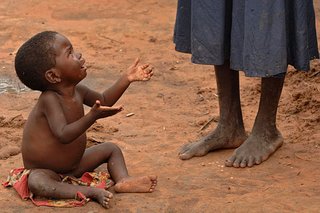 So many things, that are negative, and are every bit as real, as the new traffic lights, and the new cleaning-up effort in Kinshasa, and Lubumbashi. I have no particular propension to “diss” my own country. But I believe that if we are to change this country, we have to be able to face up to the truth. If that process means airing a bit of dirty laundry, it seems to me a very small price to pay. Today I see my country, like this little boy (picture). Young and full of potential, but facing a grim reality, and dire suffering, and a very bleak short term future… hence the tears on her face. We all need to internalize that, admit that, and stop being ashamed of a reality that we – the people – have had very little in forging. Only then will we be able to rebuild efficiently.
So many things, that are negative, and are every bit as real, as the new traffic lights, and the new cleaning-up effort in Kinshasa, and Lubumbashi. I have no particular propension to “diss” my own country. But I believe that if we are to change this country, we have to be able to face up to the truth. If that process means airing a bit of dirty laundry, it seems to me a very small price to pay. Today I see my country, like this little boy (picture). Young and full of potential, but facing a grim reality, and dire suffering, and a very bleak short term future… hence the tears on her face. We all need to internalize that, admit that, and stop being ashamed of a reality that we – the people – have had very little in forging. Only then will we be able to rebuild efficiently.Tags:













4 comments:
It's so very true...
I don't really know how to change a whole country's mentality so damn...
An honor to have your comment here, superstar!!!
It takes work, and ages, bro... ages.
great piece. I must appologise as a Pentecostal Christian that so much rubbish is finding its way to Africa especially from the US. Sadly it is a feature of Europe also where I operate (Ireland) and even Congolese who have come to Ireland are joining African churches who peddle the lie of prosperity. Jesus was a poor man for the poor people but the bad preachers are corrupting His message. I in my small way am trying to welcome Africans to my church and teach them the truth that the ways of the west are as corupt as those of the African rich men.
Thank you for that wonderful response, and your work, Pastor. You might not agree with some of my later posts... but that is okay.
Post a Comment